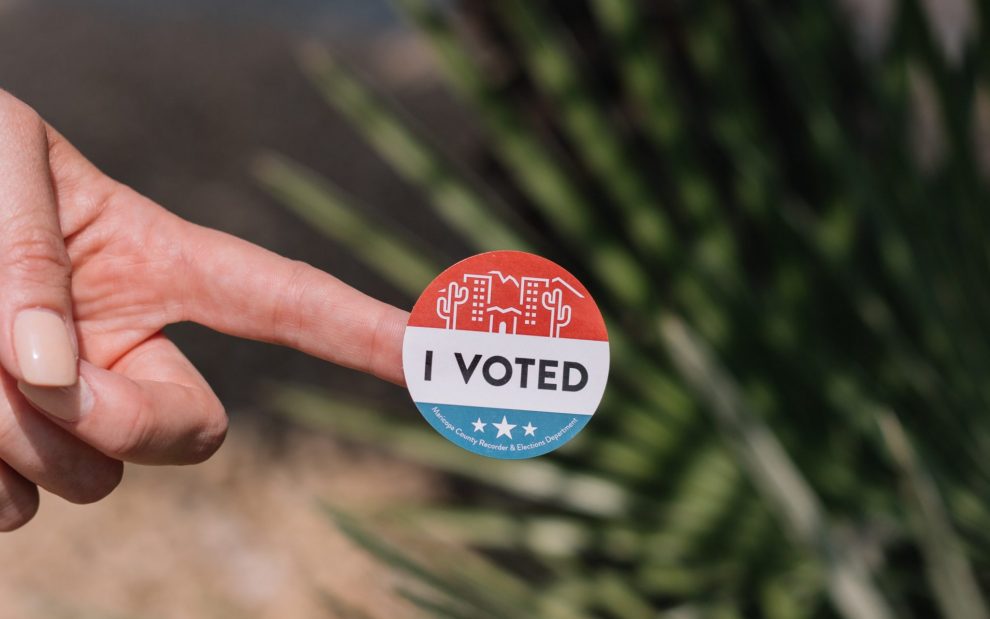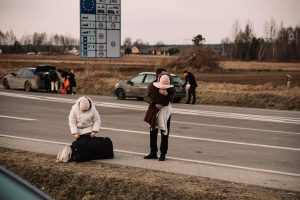“I have a right to vote!” is a common claim heard among citizens of the United States or any democracy. News media warn of voter suppression as some officials seek to make it more difficult for people to cast their ballots. People are concerned about protecting everyone’s right to vote. Equally important is everyone’s responsibility to show up at the polls: The right to vote comes with a duty to actually vote—and to do so in the most informed way possible.
Among the many resources available to Catholics in the United States as they prepare for an election are the church’s social teachings. These universal teachings receive a particular voting focus in the U.S. Conference of Catholic Bishops’ document “Forming Consciences for Faithful Citizenship.”
The bishops update the document every four years prior to the presidential election. They identify a number of issues for Catholic voters to consider. The specific suggestions are helpful, but perhaps the document’s greatest contribution is the general reminder of key principles from Catholic teaching that guide Catholic voting.
The document reminds us that the bishops “do not intend to tell Catholics for whom or against whom to vote,” just as the church does not tell Catholics how to vote. It does seek to guide its members in how to think about voting and form their consciences as they make political choices.
3 reminders from Catholic social teaching
Catholic voters are responsible for knowing the church’s values and what role faith plays in our political decisions. Morally responsible voting reflects appreciation of the common good, the various issues that support or hinder its realization, and the quality and character of the candidates who can help make this happen.
Focus on the common good
In Catholic social teaching the common good means “those conditions of social life which allow social groups and their individual members relatively thorough and ready access to their own fulfillments,” according to Gaudium et Spes (Pastoral Constitution on the Church in the Modern World). Which candidates will work for the common good? Which candidates will strive to secure decent living conditions for everyone, especially people with great needs? Common good thinking—and voting—goes beyond judging candidates on their political affiliations and beyond asking, “What will this candidate do for me?”
Consider all the issues
Catholics are not single-issue voters. Voters look at all issues facing the community, state, and nation. Then they decide which issues can be addressed at this time and by the office for which the candidates are contending. A responsible practicality guides issues assessment during an election season.
Evaluate the candidate’s character
Beyond a general focus on the common good and an examination of the issues, evaluating the character of the candidates themselves can help make voting decisions. Political leaders leave a mark on the political culture and therefore on society itself. Accepting bad personal behavior invites bad behavior regarding state and national policies.
7 issues of importance
At any time and place, different issues are of varying importance and urgency in promoting the common good. In 2020 a number of issues deserve Catholic voters’ attention when they go to the polls. While not a comprehensive list, the following seven issues are among them.
Climate change
Every month new reports from members of the scientific community warn that the effects of climate change are developing faster than previously anticipated. News services tell of increasingly severe weather events along the eastern seaboard, more severe droughts and wildfires in western states, and rising ocean levels.
In spite of the mounting evidence of global warming, the United States recently withdrew from the Paris Agreement, choosing not to cooperate with the global community to address this issue.
Caring for the environment is everyone’s responsibility. Acts leading to environmental destruction affect the quality of life for humans everywhere. They lead to hardship, especially for people who are poor and vulnerable.
The USCCB calls Catholics to address environmental challenges in its 1991 statement “Renewing the Earth.” Pope Francis, in his 2015 encyclical, Laudato Si’ (On Care for Our Common Home), writes that climate change “represents one of the principal challenges facing humanity in our day,” stressing the need for an ecological conversion grounded in our relationship with Jesus Christ. The pope calls for changes in lifestyle that can bring “healthy pressure to bear on those who wield political, economic and social power.”
Another way to influence those power structures is through voting. Which candidates acknowledge that climate change is happening and that human activity is a major cause of this phenomenon? Who among the candidates seem willing to address this issue with meaningful programs and legislation?
Racial justice
Recent protests against police violence following the killing of George Floyd by a Minneapolis police officer rocked the United States. Cities across the country experienced large demonstrations of people calling for police reform and an end to racism.
Some local governments worked to reform their police departments, hoping to end the violent abuse of power, especially against Black people, by some law enforcement officers. Equally needed is a nationwide effort to confront the racism present in society that fuels individual acts like the one that killed Floyd. Although many Americans denounce individual acts of racism, more can be done to change the underlying culture of racism that gives rise to such actions and preserves white social privilege.
Catholic teaching opposes any form of discrimination. After the death of Floyd, Pope Francis warned that Catholic indifference to
racism is not consistent with Catholic teaching on human dignity. “We cannot tolerate or turn a blind eye to racism and exclusion in any form and yet claim to defend the sacredness of every human life,” he said.
How might we address systemic racism in our society? Condemning discrimination is a start. Focusing on how we enable a culture of racism is a greater challenge.
Elected officials hold the keys to future policies, programs, and laws that will either dismantle or continue to tolerate structural, cultural racism. Where do candidates on every level stand regarding issues of racial justice?
Culture of violence
The United States struggles with multiple forms of violence carried out on a daily basis.
Abortion continues to be an example of violence and death directed against human beings. Legal protection for the unborn remains an unrealized goal. With almost 50 percent of abortions taking place among people living in poverty, we might ask how we can support mothers who choose to give birth even when faced with limited resources.
Capital punishment remains another form of publicly sanctioned violence—a practice without legal, social, or economic benefit. Total executions are at a record low, and 22 states have abolished the death penalty. Still, executions continue. As recently as July 2020, the U.S. Department of Justice resumed federal executions for the first time in more than 15 years.
Gun violence is another unchecked form of killing. Each year guns are used to kill more than 39,000 Americans. In 2019 there were more than 400 mass shootings (in which four or more people were killed, not counting the shooter).
Catholic social teaching holds up the dignity of every human being against all acts of violence. In 1995 St. Pope John Paul II addressed the many forms of violence that threaten human life throughout the world. His encyclical Evangelium Vitae (On the Inviolability of Human Life) speaks of the “culture of death” that marks societies and cultures. Today we can repeat the Holy Father’s warning.
Where are candidates on issues that contribute to a culture of violence? Do they recognize how seriously these acts of violence threaten the peace and well-being of communities? Can they grasp how blatantly the taking of another human’s life contradicts the Creator’s plans for life on this planet?
Immigrants and refugees
Every nation has the right to control its borders, but the United States’ exercise of that right seems to deny any responsibility toward people fleeing their own countries in search of safety or a better economic life. Our nation’s leaders have demonized immigrants, built a wall to keep them out, and separated children from their parents at the border.
Most citizens recognize the system is broken. As acknowledged by the U.S. Chamber of Commerce and other trade groups, we need foreign workers. Our labor force cannot supply the needed workers in such areas as agriculture and food processing,
the hospitality industry, and construction. Yet we remain stuck with immigration policies that don’t meet our needs, much less those of people desperately seeking a new life free of poverty and violence.
Catholic social teaching recognizes our duty to welcome refugees and develop immigration policies suited to our times. In their most recent version of “Forming Consciences for Faithful Citizenship,” the bishops remind us of the “scriptural call to welcome the stranger among us—including immigrants seeking work.” It is difficult to recognize this biblical mandate in our nation’s recent response to immigrants and refugees.
In his apostolic exhortation Gaudete et Exsultate (Rejoice and Be Glad), Pope Francis insists that the challenge of working with immigrants and refugees is a primary issue, saying that Christians should “stand in the shoes of those brothers and sisters of ours who risk their lives to offer a future to their children.”
Which candidates recognize this issue as the important human rights matter that it is?
Poverty
Thirty-eight million Americans live in poverty. The COVID-19 pandemic contributes to this rising number, especially among traditionally marginalized groups (center city, rural, minorities, and single-parent families) within American society. The pandemic also leaves local governments short on financial resources—revenue to assist people in poverty.
Globally the situation is even worse. A July report from the United Nations warns that the pandemic may add more than 130 million people to the ranks of those who are hungry and undernourished, for a total of 3 billion people worldwide.
The gospel calls followers of Jesus Christ to assist people who live in poverty and on the margins of society as well as those who are vulnerable in any way. Catholic social teaching adds to that challenge with its preferential option for the poor, which calls us to do more than respond to people’s immediate needs and work to change whatever causes them to be in such need. If there is a lack of access to medical services, seek changes in our health care system. If affordable housing is out of reach, make more available or seek increases in wages.
Catholics can bring attention to people who are marginalized and vulnerable during political campaigns by joining programs and organizations seeking to register low-income voters and even helping get them to the polls.
We can vote for candidates who will listen and respond to the needs of people living in poverty and who will work for necessary structural changes in society that bring benefits especially to people with the greatest needs.
Health care
The 2020 election takes place within the COVID-19 context. Our nation—and the world—is focused on this novel coronavirus that has a behavior we don’t completely understand and a spread we have difficulty controlling. COVID-19 reveals many shortcomings in our health care system. One is that more than 27 million Americans have no health insurance and therefore have difficulty seeking medical services for this virus or any other health need.
In the United States most private health insurance is tied to full-time employment, so millions of part-time workers do not receive this benefit. Further, in the past few months, more than 5 million full-time workers have lost their jobs and their health insurance.
The United States remains one of the few advanced nations today that does not provide some form of universal health care and that does not recognize medical services as a human right. Now, in the midst of this pandemic, our nation has withdrawn from the World Health Organization.
Catholic social teaching regards health care services as a right for all people. St. Pope John XXIII, in his encyclical Pacem in Terris (On Peace), states that since we regard all humans as having the right to life, we must also make sure people have what they need to live their lives in dignity. That includes access to needed medical services.
Which candidates reflect our church’s teaching on the provision of health care services to all? Who among those vying for public office recognize health care as a human right and as a necessity for realizing the common good? Which candidates have the vision and skills to help our nation enact health care reform to benefit everyone, especially those with the fewest resources?
International relations
For decades the United States has proven to be a world leader in promoting peace among nations, guiding multinational economic progress, and helping countries suffering from poverty and hunger. In recent years our nation has disengaged from this leadership role on the global scale by withdrawing from the Paris Agreement and the World Health Organization. At this time our economic relationship with China is uncertain and our leadership seems unwilling to confront Russia on its continuing efforts to undermine U.S. elections. As a nation we say little about the human rights abuses in Hong Kong and are silent on the persecution of the Uighur population in China’s Xinjiang region.
Catholic social teaching reminds us that we are one human family, that we are responsible for all of our brothers and sisters. Certainly we need to look out for the welfare of our own nation, but never in a way that denies our obligations to the global community.
In his apostolic exhortation Evangelii Gaudium (The Joy of the Gospel), Pope Francis warns against a “globalization of indifference” that leaves us “incapable of feeling compassion at the outcry of the poor.”
In “Forming Consciences for Faithful Citizenship,” the USCCB offers several corrections to the current trend in U.S. international relations. The United States should take a leading role in helping to alleviate global poverty, should offer political and financial support for international bodies effectively addressing global problems, and should provide asylum for refugees.
Which candidates are willing to help our nation reconnect with the global community as a leader committed to the welfare of all nations? Who among those seeking public office recognize the opportunities present for the United States to lead the world in alleviating global poverty and the human crises that cause so many people to abandon their homelands and become refugees and immigrants? Which candidates appreciate the benefits that come to our nation when it engages fully with the international community and promotes the common good?
In an attempt to bring needed systemic changes in any of these areas, there normally will be multiple options on the table to address the problem, including various legislative approaches. No doubt other issues could be included on this list as well, and the issues that attract our attention the most will influence our voting.
From a Catholic perspective, our choice of candidates should be guided by our best judgment about who is most likely to address those issues in a way that benefits the common good. The example of Jesus Christ as found in scripture, tradition such as that portrayed in Catholic social teaching, and guidance from the USCCB shared in the document “Forming Consciences for Faithful Citizenship” tell us that Catholics should support the option that we believe brings the greatest benefits to those persons and groups with the greatest needs. To reach that conclusion we must examine the issues as well as the candidates—their effectiveness and their character.
This article also appears in the November issue of U.S. Catholic (Vol. 85, No. 11, pages 10-16). Click here to subscribe to the magazine.
Image: Unsplash/Phillip Goldsberry














Add comment